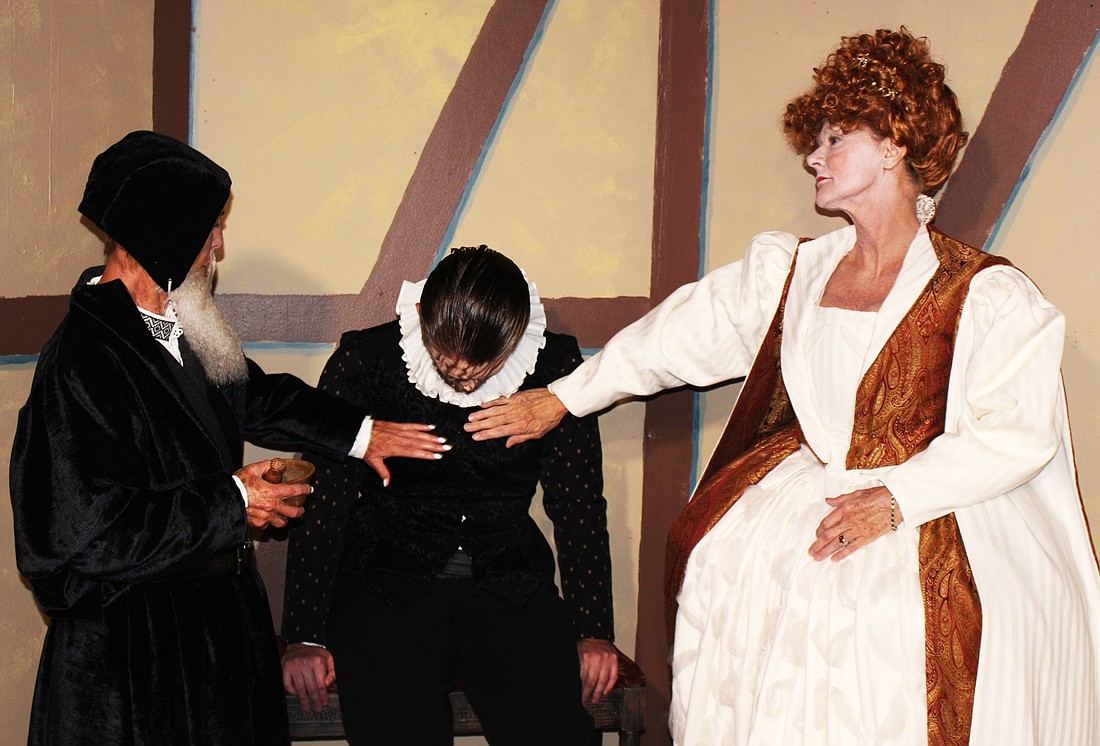- May 23, 2025
-
-
Loading

Loading

Literary scholars have offered several theories on Shakespeare’s true identity. They’ve suggested the Bard was really Christopher Marlowe, Francis Bacon, or the Earl of Oxford. Playwright Monica Cross has a theory of her own: Shakespeare was actually an alchemist’s automaton. To see a demonstration of that hypothesis, check out Cross’ “The Wonder of Our Stage,” which is now premiering at the Players Backstage.
Like Pinocchio, Cross’ Shakespeare (Zachary Hanna) is a wooden effigy who comes to life. In the Bard’s case, the vivifying agent is an alchemist named John Dee (Jan Wallace), not the Blue Fairy Godmother. Dee created this Shakesbot as a consort for Queen Elizabeth I (Pamela Hopkins). Sadly, the Queen found him a bit wooden and walked away. Dee figures her majesty will change her mind if his creation learns to be more human. He hires Richard Burbage (Rik Robertson), an entrepreneurial actor to do the job. (Acting is a humanities major, after all.) Burbage schools a disguised Shakespeare on the fine arts of boozing, carousing and dramaturgy. Instead of crying witchcraft, Burbage’s impresario brother (Glenn Schudel), helps — and puts Shakespeare to work in his theater. And Dee’s madcap scheme actually succeeds! Shakespeare’s studies of human nature evolve into stories about humanity. Those stories are a hit on stage. The mechanical man (who’s less wooden every day) finds his calling as a playwright — and ultimately wins the Queen’s heart with his words. (Strictly Platonic. She doesn’t install him in the royal bedchamber.) But that falls short of Dee’s ambitions. Worse than that, the magic of the stage proves more powerful than his own. Thanks to theater, Dee’s creation has now outgrown him. Shakespeare has truly become a man — and a man of his own. Dee doesn’t like it.
The actors put in spirited, if uneven performances, under Candace Artim’s sharp direction. (A mix of great and could-be-better. Let’s leave it at that.) Kudos to Ken Junkins for the low-rent Elizabethan set, and to Cross (yes, the playwright herself) and Georgina Wilmott for the spot-on period garb. Her royal majesty resembles an overstuffed chess piece. As she should.
Cross is a literary scholar in her own right. As you might expect, her play’s filled with Shakespearean inside baseball. There’s a nod to playwright Robert Greene’s insulting broadside. (He jealously suggested that Shakespeare an upstart hack in playwright’s clothing who considered himself, “the onely Shake-scene in a countrie.”) Cross gets the Elizabethan lingo right, without doing a flat-out imitation, i’faith. She also accurately nails the Bard’s literary sources (including Holinshed, Ovid, Plautus, Plutarch et al), which Shakespeare (and the Shakesbot) shamelessly cribbed.
Cross’ play is a winner. Literally. “The Wonder of Our Stage” won first place at last year’s New Play Festival at The Players Centre. The judges loved the unstaged reading. That’s the reason it’s on stage now, in a premiere performance.
See it if you can, especially if you paid attention in Shakespeare class. Cross’ unapologetically smart, unabashedly literate play is great theater. Aside from two missteps …
Structurally, Cross is excellent at scene construction. But her playscript often feels more like a screenplay. Her scenes are parlous short. While brevity is the soul of wit, the constant intercutting fights the needs of storytelling — especially in a dense story like this. In terms of character, Dee (who’s modeled after Prospero in “The Tempest”) is a heartless mage. His automaton is a means to an end. Shakespeare sees him as a father; Dee sees his creation as a mistake.
As that creation slowly surpasses him, the creator grinds his teeth. The dynamic of their conflict echoes the squabbles of any rebellious teenage son and his disapproving father. (Thou dost not get me, dad!”) It’s poignantly funny — until it turns tragic. That’s exactly where the story should go. But there’s no ambiguity to Dee’s rejection of his “son,” no divided heart. Love and ambition should have battled for the alchemist’s soul. But Dee’s a heel through and through.
Aside from these quibbles, Cross’ improbable coming-of-age story is oddly moving. Like Pinocchio in the 19th century and Commander Data in the 24th century, the playwright’s artificial Shakespeare simply wants to be human. He can’t take it for granted; he has to earn it. That shouldn’t apply to the rest of us natural born humans.
A glimpse at 21st-century headlines says otherwise.